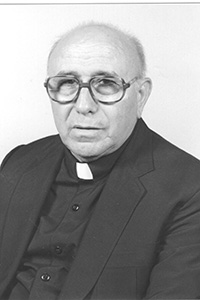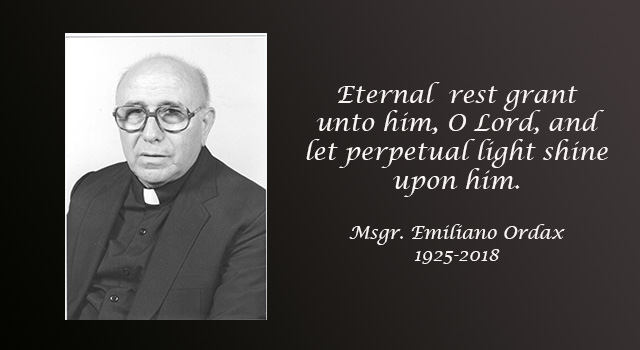By Ana Rodriguez Soto - Florida Catholic newspaper
MIAMI | He spent most of his life in the “mission fields” of South Florida, working among migrants and his “favorite people” — the poor. When he was given the honorary title of monsignor in 1998, he described himself as having a “tried and true” vocation, as well as a natural tendency to “rebelliousness.”
That was proven when, against all odds and financial difficulties, Msgr. Emiliano Ordax built a new church for St. Cecilia Parish, located in one of the poorest neighborhoods in Hialeah. For years, he also defended migrant farmworkers from those he called “indifferent capitalists” in La Belle and Immokalee.

Photographer: FILE
Msgr. Emiliano Ordax: Born April 20, 1925; ordained Aug. 28, 1948; named a monsignor September, 1998; died March 12, 2018.
Those were among the first and last acts of Msgr. Ordax’s priesthood, which began when he entered the seminary at age 11 in his native Spain, at the outbreak of the Spanish Civil War. He had been a priest for nearly 70 years, and would have been one of the honorees at this year’s chrism Mass, to be celebrated the Tuesday of Holy Week.
Msgr. Ordax died March 12, at the age of 92, after spending a few days in the care of Catholic Hospice. He had served as pastor of St. Cecilia Church for 25 years, from 1979 until his retirement from active ministry in 2004. He had arrived in Miami in December 1960, after working in the Diocese of Camaguey, Cuba, since 1954.
Msgr. Ordax had gone to Cuba as a missionary, one of the members of OCSHA — the Obra de Cooperación Sacerdotal Hispano-Americano, an organization that recruited Spanish priests to work in Latin America. Eventually, the “mission lands” came to include Florida.
“To him and his Spanish confreres we owe a debt of gratitude for nurturing and developing the Catholic faith in our state,” said Archbishop Emeritus John C. Favalora, who asked the Vatican to give Msgr. Ordax that honorary title in 1998 — his 50th anniversary as a priest.
“Our strong and vital Hispanic Catholic presence in Florida is the abundant harvest of their generous and inspiring labors,” the archbishop said upon hearing of Msgr. Ordax’s death. “I was proud to request the Holy Father to name him a Monsignor so as to signal the appreciation of the archdiocese to him and all of the OCSHA priests who have served us so well. I join so many of his grateful former parishioners in praying the good Lord grant Monsignor Emiliano, his good and faithful missionary servant, the promised reward of eternal life.”
Born April 20, 1925 in Bordeaux, France, to Spanish “campesinos” who worked the vineyards of that region, Msgr. Ordax moved back with his family to their native Valladolid in 1932. Four years later, in the midst of what he described as the “terror, grief and blood” of the Spanish Civil War, he entered the seminary in Zamora.
Msgr. Ordax told a Florida Catholic interviewer back in 1998 that its upper three floors served as a hospital for wounded soldiers in the war.
He was ordained a priest Aug. 28, 1948. To fulfill his compulsory military service, he worked as auxiliary chaplain at the military hospital in Salamanca while studying sacred theology at the nearby pontifical university.
From 1950 to 1954 he served as pastor in two towns of the Diocese of Zamora, then joined OCSHA and was promptly assigned to Cuba, where he tended to the needs of sugarcane workers and their families.
After arriving in the then Diocese of Miami, he spent a few months at Corpus Christi Parish in the Wynwood neighborhood before being assigned to work at St. Francis Xavier Parish in Fort Myers. From 1962 to 1967 he served as administrator of Catholic missions in LaBelle (Our Lady Queen of Heaven) and Immokalee (Our Lady of Guadalupe), all of which were then part of the Miami diocese.
There, he devoted himself to defending the rights of long-suffering migrant workers against the “indifferent capitalists” who employed them. In LaBelle, he said his proudest accomplishment was building a church for the poor community, “against the advice of the bishop and other counselors.”
He returned to Miami in 1967, serving as parochial vicar of St. Michael the Archangel, then in 1969 as parochial vicar at St. Mary Cathedral. In 1970 he was named administrator of San Juan Bautista Mission for Puerto Ricans, once again in the Wynwood neighborhood. From 1972 to 1979, he served as parochial vicar at St. John the Apostle in Hialeah.
In between, he obtained a Bachelor’s degree in Latin American and English literature from Villanova University.
On July 4, 1979, he took over as administrator, and later pastor, of St. Cecilia Church, a community which is predominantly Hispanic, working-class, poor and immigrant. There, he started a day care center and a Casita (little house) to provide social services for the people: food for 87 families each week, counseling services, housing and employment assistance, and advice on immigration matters.
The parish secretary in 1998, Magda Barzana, described her boss this way to the Florida Catholic, on the occasion of his 50th anniversary in the priesthood: “I have not known any other person who better represents the priesthood. And I’ve worked with some really good ones.”
She noted that “every person who comes here hungry, he takes them out to eat. I have never seen him turn away anybody.” The parish offered more than 20 programs to aid the poor, she said, and Msgr. Ordax “has struggled to start all of them.”
He also managed, with the help of loans from the archdiocese, to erect a new church for the community after the ailing roof of the original building — a converted Baptist temple — succumbed to the winds of Hurricane Andrew.
Being named a monsignor is a great honor, Msgr. Ordax noted at the time, but on a personal level, nothing has changed. “With or without the title I will always be me,” he said, someone characterized by “an innate rebelliousness.”
By way of proving it, he added: “I have faced temptation like every human being. Many temptations, many struggles. But being a monsignor was never one of them.”
The wake for Msgr. Ordax will take place Friday, March 16, from 6 to 11 p.m. at St. Cecilia, with a prayer service starting at 8 p.m. The funeral Mass will be celebrated there Saturday, March 17, at 10 a.m., followed by burial at Our Lady of Mercy Cemetery in Doral. St. Cecilia is located at 1040 W. 29 St., Hialeah.

